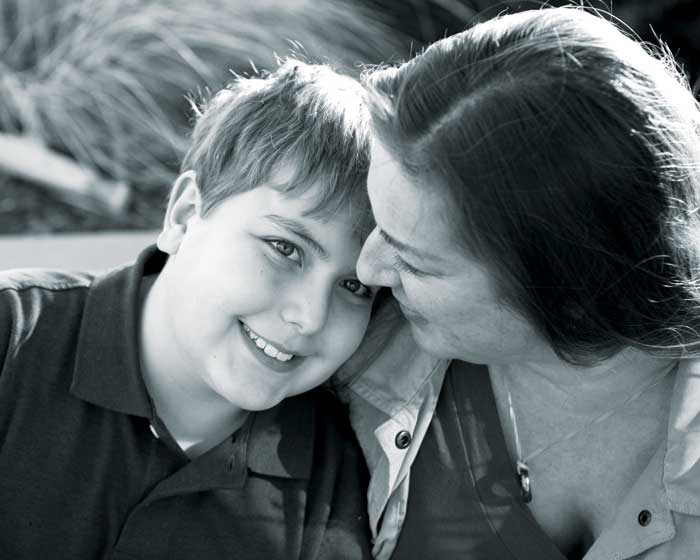
Max Smtih and his mom, Lolly Block, say it’s OK to be scared when you’re sick, but it’s also OK to have fun—their saving grace after discovering Max’s rare disease that led to brain surgery. Photo courtesy of Lolly Block.
Just before surgery to remove part of his brain, 12-year-old Max Smith put a fake eyeball in his belly button. “The last thing I remember before going under is the doctor screaming,” he says and laughs.
For his tenacious positivity and fun, Smith was recently chosen as a Children’s Miracle Network Champion for Colorado and represents Children’s Hospital Colorado at events. “It’s OK to be scared when you’re sick, but it’s also OK to have fun,” the Lowry resident says. Nurses and doctors at the hospital, who Smith still visits, say he makes everyone laugh.
Smith first visited Children’s Hospital Colorado in 2012 when inklings of a disorder appeared. He couldn’t control his bladder and spent most of his summer baseball season running to the bathroom during games. The pesky problem—along with headaches and dehydration—brought him and his mom, Lolly Block, to Children’s Hospital where he was diagnosed with diabetes insipidus. Unlike the common form of diabetes related to blood sugar, diabetes insipidus is related to large amounts of urine.
To rule out other medical issues, Smith had an MRI. “It’s horrifying to hear your child has a brain tumor and they don’t know what it is yet but it doesn’t look good,” Block says, remembering the phone call with the MRI results. Smith had a brain lesion and needed a craniotomy, removing part of the brain. Block says she can no longer drink coffee because of the amount she drank during his craniotomy—even the smell makes her sick now.
White blood cells had eaten away part of the pituitary gland in his brain, which coordinates with the kidneys to control hydration and urine, explaining his bladder issues. This is a result of Langerhans cell histiocytosis (LCH), a disorder that causes a buildup of white blood cells, which normally fight infections but in excess cause tumors or damage organs. One in 200,000 children has the disorder, according to the Histiocytosis Association.
Smith underwent 29 rounds of chemo. “Max’s whole journey in the hospital was filled with pranks and a lot more laughter than you’d anticipate from a kid who had brain surgery,” Block says.
During chemo, he entertained nurses with Groucho Marx impressions and often surprised them in disguises including wigs and fake chest hair.
“You can’t forget to live when you’re terrified,” Block says.
“My mom was even making fun of me,” Smith says. The two laugh.
“That is true. We had such terrible gallows humor it was embarrassing at times, but we laughed and that helped us through moment to moment.”
As a parent, she says the same is true—it’s OK to be scared, but it’s also OK to have fun. The two say they have grown closer through the experience.
Smith has quarterly MRIs and will have to take medicine for the rest of his life to replicate the hormone his brain lacks to be able to communicate with his kidneys. As a side effect, the drug destroys the thirst mechanism so he never knows when to drink water—a problem in dry, hot Colorado summers. Besides monitoring his hydration, effects from his LCH are gone. “We’re just going to hope like crazy it never comes back,” she says.




0 Comments